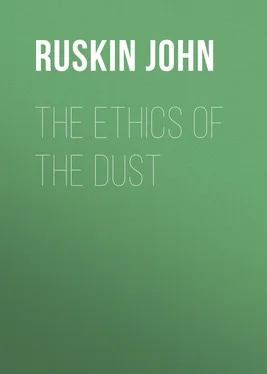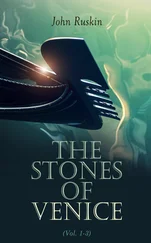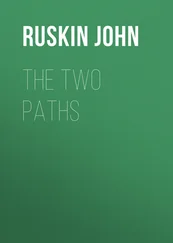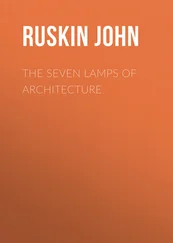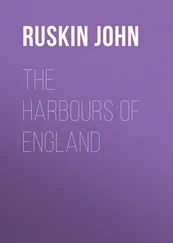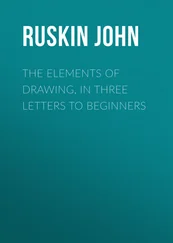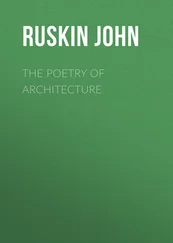John Ruskin - The Ethics of the Dust
Здесь есть возможность читать онлайн «John Ruskin - The Ethics of the Dust» — ознакомительный отрывок электронной книги совершенно бесплатно, а после прочтения отрывка купить полную версию. В некоторых случаях можно слушать аудио, скачать через торрент в формате fb2 и присутствует краткое содержание. Жанр: foreign_prose, foreign_religion, Философия, literature_19, foreign_psychology, foreign_antique, на английском языке. Описание произведения, (предисловие) а так же отзывы посетителей доступны на портале библиотеки ЛибКат.
- Название:The Ethics of the Dust
- Автор:
- Жанр:
- Год:неизвестен
- ISBN:нет данных
- Рейтинг книги:4 / 5. Голосов: 1
-
Избранное:Добавить в избранное
- Отзывы:
-
Ваша оценка:
- 80
- 1
- 2
- 3
- 4
- 5
The Ethics of the Dust: краткое содержание, описание и аннотация
Предлагаем к чтению аннотацию, описание, краткое содержание или предисловие (зависит от того, что написал сам автор книги «The Ethics of the Dust»). Если вы не нашли необходимую информацию о книге — напишите в комментариях, мы постараемся отыскать её.
The Ethics of the Dust — читать онлайн ознакомительный отрывок
Ниже представлен текст книги, разбитый по страницам. Система сохранения места последней прочитанной страницы, позволяет с удобством читать онлайн бесплатно книгу «The Ethics of the Dust», без необходимости каждый раз заново искать на чём Вы остановились. Поставьте закладку, и сможете в любой момент перейти на страницу, на которой закончили чтение.
Интервал:
Закладка:
L. Yes; you must be very careful to keep your order; you will soon find out how to do it; it is only like soldiers forming square, except that each must stand still in her place as she reaches it, and the others come round her; and you will have much more complicated figures, afterwards, to form, than squares.
ISABEL. I'll put a stone at my place: then I shall know it.
L. You might each nail a bit of paper to the turf, at your place, with your name upon it: but it would be of no use, for if you don't know your places, you will make a fine piece of business of it, while you are looking for your names. And, Isabel, if with a little head, and eyes, and a brain (all of them very good and serviceable of their kind, as such things go), you think you cannot know your place without a stone at it, after examining it well,—how do you think each atom knows its place, when it never was there before, and there's no stone at it?
ISABEL. But does every atom know its place?
L. How else could it get there?
MARY. Are they not attracted into their places?
L. Cover a piece of paper with spots, at equal intervals; and then imagine any kind of attraction you choose, or any law of attraction, to exist between the spots, and try how, on that permitted supposition, you can attract them into the figure of a Maltese cross, in the middle of the paper.
MARY (having tried it). Yes; I see that I cannot:—one would need all kinds of attractions, in different ways, at different places. But you do not mean that the atoms are alive?
L. What is it to be alive?
DORA. There now; you're going to be provoking, I know.
L. I do not see why it should be provoking to be asked what it is to be alive. Do you think you don't know whether you are alive or not?
(ISABEL skips to the end of the room and back.)
L. Yes, Isabel, that's all very fine; and you and I may call that being alive: but a modern philosopher calls it being in a "mode of motion." It requires a certain quantity of heat to take you to the sideboard; and exactly the same quantity to bring you back again. That's all.
ISABEL. No, it isn't. And besides, I'm not hot.
L. I am, sometimes, at the way they talk. However, you know, Isabel, you might have been a particle of a mineral, and yet have been carried round the room, or anywhere else, by chemical forces, in the liveliest way.
ISABEL. Yes; but I wasn't carried: I carried myself.
L. The fact is, mousie, the difficulty is not so much to say what makes a thing alive, as what makes it a Self. As soon as you are shut off from the rest of the universe into a Self, you begin to be alive.
VIOLET (indignant). Oh, surely—surely that cannot be so. Is not all the life of the soul in communion, not separation?
L. There can be no communion where there is no distinction. But we shall be in an abyss of metaphysics presently, if we don't look out; and besides, we must not be too grand, to-day, for the younger children. We'll be grand, some day, by ourselves, if we must. (The younger children are not pleased, and prepare to remonstrate; but, knowing by experience, that all conversations in which the word "communion" occurs, are unintelligible, think better of it.) Meantime, for broad answer about the atoms. I do not think we should use the word "life," of any energy which does not belong to a given form. A seed, or an egg, or a young animal, are properly called "alive" with respect to the force belonging to those forms, which consistently develops that form, and no other. But the force which crystallizes a mineral appears to be chiefly external, and it does not produce an entirely determinate and individual form, limited in size, but only an aggregation, in which some limiting laws must be observed.
MARY. But I do not see much difference, that way, between a crystal and a tree.
L. Add, then, that the mode of the energy in a living thing implies a continual change in its elements; and a period for its end. So you may define life by its attached negative, death; and still more by its attached positive, birth. But I won't be plagued any more about this, just now; if you choose to think the crystals alive, do, and welcome. Rocks have always been called "living" in their native place.
MARY. There's one question more; then I've done.
L. Only one?
MARY. Only one.
L. But if it is answered, won't it turn into two?
MARY. No; I think it will remain single, and be comfortable.
L. Let me hear it.
MARY. You know, we are to crystallize ourselves out of the whole playground. Now, what playground have the minerals! Where are they scattered before they are crystallized; and where are the crystals generally made?
L. That sounds to me more like three questions than one, Mary. If it is only one, it is a wide one.
MARY. I did not say anything about the width of it.
L. Well, I must keep it within the best compass I can. When rocks either dry from a moist state, or cool from a heated state, they necessarily alter in bulk; and cracks, or open spaces, form in them in all directions. These cracks must be filled up with solid matter, or the rock would eventually become a ruinous heap. So, sometimes by water, sometimes by vapor, sometimes nobody knows how, crystallizable matter is brought from somewhere, and fastens itself in these open spaces, so as to bind the rock together again with crystal cement. A vast quantity of hollows are formed in lavas by bubbles of gas, just as the holes are left in bread well baked. In process of time these cavities are generally filled with various crystals.
MARY. But where does the crystallizing substance come from?
L. Sometimes out of the rock itself; sometimes from below or above, through the veins. The entire substance of the contracting rock may be filled with liquid, pressed into it so as to fill every pore;—or with mineral vapor;—or it may be so charged at one place, and empty at another. There's no end to the "may be's." But all that you need fancy, for our present purpose, is that hollows in the rocks, like the caves in Derbyshire, are traversed by liquids or vapor containing certain elements in a more or less free or separate state, which crystallize on the cave walls.
SIBYL. There now;—Mary has had all her questions answered: it's my turn to have mine.
L. Ah, there's a conspiracy among you, I see. I might have guessed as much.
DORA. I'm sure you ask us questions enough! How can you have the heart, when you dislike so to be asked them yourself?
L. My dear child, if people do not answer questions, it does not matter how many they are asked, because they've no trouble with them. Now, when I ask you questions, I never expect to be answered; but when you ask me, you always do; and it's not fair.
DORA. Very well, we shall understand, next time.
SIBYL. No, but seriously, we all want to ask one thing more, quite dreadfully.
L. And I don't want to be asked it, quite dreadfully; but you'll have your own way, of course.
SIBYL. We none of us understand about the lower Pthah. It was not merely yesterday; but in all we have read about him in Wilkinson, or in any book, we cannot understand what the Egyptians put their god into that ugly little deformed shape for.
L. Well, I'm glad it's that sort of question; because I can answer anything I like to that.
EGYPT. Anything you like will do quite well for us; we shall be pleased with the answer, if you are.
L. I am not so sure of that, most gracious queen; for I must begin by the statement that queens seem to have disliked all sorts of work, in those days, as much as some queens dislike sewing to-day.
EGYPT. Now, it's too bad! and just when I was trying to say the civillest thing I could!
L. But, Egypt, why did you tell me you disliked sewing so?
EGYPT. Did not I show you how the thread cuts my fingers? and I always get cramp, somehow, in my neck, if I sew long.
Читать дальшеИнтервал:
Закладка:
Похожие книги на «The Ethics of the Dust»
Представляем Вашему вниманию похожие книги на «The Ethics of the Dust» списком для выбора. Мы отобрали схожую по названию и смыслу литературу в надежде предоставить читателям больше вариантов отыскать новые, интересные, ещё непрочитанные произведения.
Обсуждение, отзывы о книге «The Ethics of the Dust» и просто собственные мнения читателей. Оставьте ваши комментарии, напишите, что Вы думаете о произведении, его смысле или главных героях. Укажите что конкретно понравилось, а что нет, и почему Вы так считаете.
